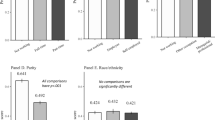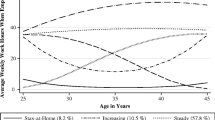Abstract
Trends in women's labor force participation between 1967 and 1981 are noted as background to this 14-year longitudinal study of 117 women who graduated from college in 1967 and were studied in 1967, 1970, and 1981. The women represent a stratified random sample of the graduating class of 1967 from one large midwestern university. The three strata are role-innovators (women in male-dominated occupations, traditionals (women in female-dominated occupations), and moderates (women in occupations having 30 to 50% women). Samplewide changes are consistent with national trends: increased employment, increased role-innovation, greater educational achievement, and later and smaller families than expected in 1967. There was also a dramatic increase in perceived conflict between marriage and career. Within these trends, however, large parts of the sample showed strong consistency: 81% of the original role innovators and 69% of the original traditionals were still role-innovators and traditionals, respectively, in 1981. This longer term consistency overrode a great deal of temporary change in the traditional direction between 1967 and 1970, particularly for the role innovators and moderates. Much of this temporary shift was associated with early child rearing. Factors associated with increased role innovation and increased traditionality were the importance women gave to having a career, the relative priorities they placed on career vs family, their expectations of marriage-career conflict, and their expections of husband's acceptance of their career. Increased role innovation was also associated with attaining more education, not marrying, and having fewer children.
Similar content being viewed by others
References
Bielby, D. D., & Bielby, W. T. Work commitment, sex-role attitudes, and women's employment. American Sociology Review 1984, 49 234–247.
Bird, C. Born female. New York: David McKay, 1968.
Gerson, M., Alpert, J. L., & Richardson, M. Mothering: The view from psychological research. Signs 1984, 4(3), 434–453.
Gottfredson, L. S. Circumscription and compromise: A developmental theory of occupational aspirations. Journal of Counseling Psychology Monographs 1981, 28 545–579.
Kaufman, D. R., & Richardson, B. L. Achievement and women. New York: Free Press, 1982.
Laws, J. L. Problems of access and problems of success in women's career advancement. Paper presented at the Conference on Attitudinal and Behavioral Measurement in Social Processes/Women's Research. National Institute of Education, Washington, D.C., December 1980.
Mednick, M. T. S., Tangri, S. S., & Hoffman, L. W. Women and achievement. Washington, D.C.: Hemisphere Publishing, 1975.
National Center for Educational Statistics. Fall enrollment in colleges and universities. Washington, D.C., 1967 and 1980.
National Science Foundation. Women and minorities in science and engineering. Washington, D.C., 1984. Appendix Table 69, p. 167.
Nieva, V. F., & Gutek, B. A. Women and work. New York: Praeger, 1981.
Rexroat, C., & Shehan, C. Expected versus actual work roles of women. American Sociology Review 1984, 49 349–358.
Richardson, M. S., & Johnson, M. Counseling women. In S. D. Brown & R. W. Teve (Eds.), Handbook of counseling psychology. New York: John Wiley & Sons, 1984.
Smith, R. E. (Ed.), The subtle revolution. Washington, D.C.: The Urban Institute, 1979.
Tangri, S. S. Determinants of occupational role-innovation among college women. J. Social Issues 1972, 28(2), 177–200.
Tangri, S. S. Effects of background, personality, college and post-college experiences on women's post-graduate employment. Final report to the U.S. Department of Labor, July 1974.
Treiman, D. J. The work histories of women and men: What we know and what we need to find out. In Alice S. Rossi (Ed.), Gender and the life course. New York: Aldine, 1985.
Author information
Authors and Affiliations
Additional information
This research has been supported by NIMH (Grant No. 5-F1-MH-30, 493-03), U.S. Department of Labor (Grant No. 91-34-71-02), The Urban Institute, The Henry A. Murray Research Center at Radcliffe College, Providence College, University of California at Santa Cruz, Harvard University, and by a grant from the Mobil Foundation to Radcliffe College. The 1967 and 1970 data are archived at The Murray Center.
Rights and permissions
About this article
Cite this article
Tangri, S.S., Jenkins, S.R. Stability and change in role innovation and life plans. Sex Roles 14, 647–662 (1986). https://doi.org/10.1007/BF00287695
Issue Date:
DOI: https://doi.org/10.1007/BF00287695




